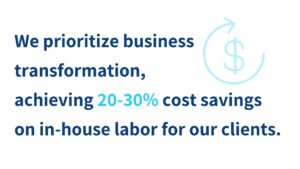Fractional accounting is an emerging finance management strategy that is becoming increasingly popular in the business world. This approach allows companies to outsource their financial and accounting services to external experts, thereby freeing up valuable time for business leaders to focus on other critical tasks. It is like having a Chief Financial Officer (CFO) on your terms!
Fractional accounting offers flexibility and efficiency in managing finances with real-time insights and solutions for sound decision-making. This allows companies to quickly respond to changes in their business and industry. By opting for fractional accounting, businesses can access high-quality financial services without committing to a full-time team, thereby reducing fixed costs during slow business periods.
While many business leaders are apprehensive about transitioning from a full-time in-house team to fractional accounting, they must be aware of the significant savings they can enjoy in terms of time and resources spent on hiring, training, and retaining employees.
At Bright Balance, we are committed to helping companies transition smoothly to our fractional accounting model. However, it is essential to note that for this agile financial partnership to work, both parties must understand their pivotal role in ensuring its success.
What works in Fractional Accounting?
Key aspects for the Business owner
Openness to acquiring fractional help
Entrepreneurial leaders often struggle with the overwhelming workload and mounting financial obligations that come with scaling up a business. Engaging with accounting experts early on can help avoid missed deadlines and ensure compliance.
Fractional assistance is a cost-effective solution that allows businesses to quickly access a team of experts without the need for a full-time hire. This eliminates the need for training and compensation, saving businesses both time and money.
However, business owners need to be open to accepting insights, guidance, and potential changes in decision-making that may come with engaging with fractional assistance. Our team is dedicated to providing valuable insights and analysis to help businesses make informed decisions and achieve their desired targets and goals.
Finding the right professionals
As a business owner or leader, you are likely aware of the challenges that come with finding and retaining top talent in your organization. Fractional accounting is an effective solution that requires selecting the right experts for the job.
To achieve optimal results, businesses require a team with diverse industry experience that can develop and execute strategies aligned with their objectives, while also providing a competitive edge. Our team at Bright Balance consists of over 60 accounting and finance experts, including nine seasoned CFOs.
 Communication, Collaboration, and Coordination
Communication, Collaboration, and Coordination
Efficient communication is a crucial aspect of ensuring that organizational goals are met through successful collaboration between the internal team and the fractional team. This requires both parties to clearly understand their respective roles and work together seamlessly towards common objectives.
To achieve this, it is imperative to maintain transparency in communication, which can be facilitated by the client’s clear articulation of their short-term and long-term financial goals, aligning them with the fractional accounting services.
Close collaboration with the fractional team can help optimize financial resources for sustainable growth and success. This collaboration requires the business owner to work closely with the fractional team daily, sharing insights, addressing problems, and adapting to changing priorities and expectations.
It is important to collaborate openly on strategic financial planning, particularly during critical business milestones such as product launches, acquisitions, and expansions. Coordination aligns all parties towards a common goal, leading to the accomplishment of shared objectives.
Data provision
Providing your fractional accountant with swift access to your accounting data is vital for facilitating a seamless transition. Your financial information must be easily accessible to the fractional team, serving as the foundation for formulating a sound financial strategy for your enterprise. Moreover, it is imperative to share access to your accounting systems and software on time to expedite the onboarding process, enabling you to commence working towards achieving your objectives.
The Fractional Accountant
Accuracy in Record-Keeping
As a fractional accountant, it is crucial to maintain the accuracy of financial records by carefully analyzing financial data, reconciling accounts, and maintaining detailed documentation that conforms to industry standards and regulations. To minimize the risks of financial mismanagement, it is imperative to establish robust internal controls promptly.
Leveraging their proficiency in accounting principles and software, fractional accountants must review transactions, identify discrepancies, and rectify errors expeditiously. Diligent oversight and attention to detail are therefore indispensable skills for fractional accountants to uphold the reliability of financial records, providing stakeholders with accurate insights for informed decision-making and regulatory compliance.
Consistent Monitoring of Finances
Fractional teams are responsible for more than just basic bookkeeping tasks. They provide valuable insights and recommendations to optimize a business’s financial performance and reduce risks, contributing to the overall stability and growth of the company. By consistently monitoring finances, these teams can detect anomalies, identify trends, and make timely adjustments to financial strategies.
In their role, fractional teams oversee financial transactions and analyze data to identify potential issues and trends, providing regular financial reports. By closely collaborating with the management team, they help ensure transparency, compliance, and strategic decision-making based on a thorough understanding of the business’s financial health. Therefore, fractional teams play a vital role in monitoring finances and providing continued support beyond project completion.
Proficiency in Technology integrations
Using advanced accounting software, data analytics tools, and cloud-based platforms certainly optimizes financial operations for businesses and enhances the efficiency of accounting teams. By doing so, processes such as bookkeeping, financial reporting, and budgeting are streamlined for timely and accurate reporting, resulting in reduced errors and real-time access to critical financial data.
Fractional teams can help businesses navigate complex accounting software and systems that are crucial in achieving efficiency. With automation and cloud-based solutions, businesses can achieve greater financial agility and competitiveness in the accounting industry. Fractional accountants offer strategic guidance on selecting and implementing the right technological solutions for the business, as well as help teams with the skills needed to use the technology effectively.
Ultimately, the integration of advanced technology in accounting empowers businesses to achieve greater financial agility and competitiveness, which is essential in today’s fast-paced business environment.
Effective communication & Open lines of communication
Fractional accountants play a crucial role in connecting financial data with strategic decision-making. To achieve this, they must possess excellent communication skills and be able to explain complex financial information clearly and concisely to various stakeholders, including executives, investors, and team members.
By communicating financial insights transparently and on time, fractional accountants ensure that critical financial information is comprehended, which facilitates informed decision-making and fosters trust and alignment throughout the organization. Their ability to convert financial data into actionable insights empowers teams to drive growth, optimize resources, and accomplish long-term financial objectives.
What Doesn’t Work in Fractional Accounting?
Lack of Trust!
Establishing trust is fundamental to the success of a fractional partnership between an accountant and a client. This is particularly crucial when the accountant is working remotely as any lack of trust may lead to skepticism regarding the accuracy and integrity of the accountant’s work, resulting in delays in decision-making, communication breakdowns, and inadequate financial data being provided to the accountant.
To ensure effective financial management, it is essential to establish trust at the outset of the partnership. Open communication, transparency, and mutual understanding are critical components of a successful fractional accounting relationship. These factors foster a collaborative environment in which both parties can work together seamlessly, resulting in better financial outcomes.
Poor Communication!
Effective communication is an essential component of successful fractional accounting. Inadequate communication often results in significant hurdles to transparency, collaboration, and shared vision. Fractional teams are tasked with managing multiple critical financial aspects of the business simultaneously, and any communication breakdown can lead to misunderstandings, errors, delays, and loss of trust.
Clear and consistent communication enables clients to stay informed, ensure decisions are based on accurate data, and effectively manage the overall financial aspect of the business. It is crucial to maintain open communication channels to ensure that everyone involved understands the financial status of the business and can make informed decisions.
Insufficient Accounting Data!
Adequate accounting data is vital in the initial stages of a partnership as it provides a strong foundation for informed decision-making and comprehensive financial analysis. Fractional accountants equipped with sufficient data can accurately track performance metrics, assess profitability, and identify trends, thereby offering valuable insights and strategic recommendations to businesses.
The lack of adequate data negatively affects the timeliness of financial reporting necessary for informed decision-making, compromising the effectiveness of fractional accounting in providing timely insights for businesses. The absence of information disrupts the ability to track performance metrics, assess profitability, and make strategic adjustments, ultimately undermining the effectiveness of fractional accounting services.
A comprehensive understanding of financial data enhances the effectiveness of fractional accounting services, contributing to improved decision-making and business success.
The Bright Balance Solution
Fractional accounting is a highly effective financial management approach that provides businesses with accurate and transparent insights to enhance their decision-making process. This tool is particularly beneficial in complex and modern markets, where businesses need to adapt quickly to change and make informed decisions to achieve sustained success.
To maximize the benefits of fractional accounting, both businesses and their fractional accounting services provider need to actively participate in key areas, ensuring a tailored approach that aligns seamlessly with the unique needs and goals of the business.
At Bright Balance, we encourage business owners to embrace fractional accounting by acknowledging their need for help and collaborating seamlessly with the fractional team for a successful partnership. With the right team on your side, you can rest assured that your finances are in good hands, freeing up more time for other strategic tasks that contribute to your business’s success. Contact our Dallas office for a complimentary CFO consultation to explore the benefits of Fractional Accounting with Bright Balance today!
info@brightbal.com
www.brightbal.com
Dallas Office Phone Number: (214) 305-6094



